Wix vs WordPress: 10 Differences to Consider in 2024
Our independent research projects and impartial reviews are funded in part by affiliate commissions, at no extra cost to our readers. Learn more
Whether you choose Wix or WordPress.org will depend on your unique website-building needs.
Wix is a website builder, so it’s perfect if you have little technical experience and you want an all-in-one package. Meanwhile, WordPress is a content management system (CMS), which is better if you value independence and complete creative control over your website.
To accurately compare each platform fully, we’ve combined our 10+ years of website building experience and rigorous research to help you decide which is best for you. Before we go in-depth, here’s a quick snapshot of what we found:
We’ll compare all of the important elements in-depth below. But if you’re short on time, we’ll give you the gist.
Wix is better for you if you’re not tech savvy…
…if you don’t have a lot of technical experience in creating websites, and want an easy-to-use platform with no coding required. Paid plans start at $16/month.
Try Wix if this sounds like you!
WordPress is better for you if know how to code…
…if you’re a little more tech savvy and comfortable with coding, and you want power and flexibility. Costs vary, but generally, you’ll be looking at around a $200 setup fee with ongoing monthly costs in place after that.
Try WordPress if this sounds up your street!
Want to cut to the chase and find out which platform is best for you? Take our quick and easy quiz and get a personalized recommendation.
Wix vs WordPress: Quick Comparison
Before we get into the details in section one, here is Wix versus WordPress at a glance:
| Category & Winner | Wix | WordPress |
|---|---|---|
| Ease of Use Winner: Wix | One of the easiest to use drag-and-drop website builders on the market. You don’t need to know how to code, since Wix is catered to non-technical users. | Steep learning curve (not beginner friendly). While coding isn't essential, it can be helpful to get the most out of WordPress' customization options. You also need to know about web hosting to pick your provider before starting out. |
| Design and Customization Winner: Wix | Over 800 professionally designed templates for you to work off, but you can’t switch templates without redesigning your site. | Almost limitless control over your site’s aesthetic, especially if you enjoy coding. Remember we recommend you use WordPress themes built by the platform itself. |
| Apps and Plugins Winner: Wix | Wix has over 300 apps, and all the features and functions are closely controlled, monitored, and tested to ensure they work properly. | Very flexible and customizable, but could be problematic if your custom tools or plugins break down. |
| Ecommerce Winner: Wix | Built-in sales features in any of its ecommerce plans. Perfect for small online stores. | Must install a plugin like WooCommerce to create an online store. Better for pure ecommerce sites, or for selling in bulk. |
| Blogging It’s a tie! | Supports categories, tagging, mobile blogging, and contributing authors. Includes a free media library. | Also supports categories and tagging, along with featured images, post backdating, and private posts. |
| SEO It’s a tie! | Basic SEO functionality, Semrush keyword tools, with advanced features included via Site Booster on the Core plan or higher. | Basic SEO tools, with Yoast plugin providing advanced features at a premium cost of $69 for one website. |
| Ongoing Maintenance Winner: Wix | Since Wix doesn’t open its platform to external developers, it controls all aspects of the platform – meaning it manages all the updates and maintenance work for you. | Requires frequent maintenance and monitoring, especially if there are updates to the platform, theme, or plugins. You are responsible for maintaining your website. |
| Help and Support Winner: Wix | Dedicated support team with knowledge center, live chat, organized tutorials, and 24/7 phone support. You can also get help via email. | Large community forum full of discussions, but not well organized. Getting a timely response is also inconsistent. |
| Pricing and Ongoing Commitments Winner: WordPress | 4 premium plans, ranging from $16 per month to $159 per month (based on annual plans). You can also use Wix for free, but it has certain limitations. | Could range from $5 – $15,000 per month, depending on various factors (hosting, themes, plugins, hiring help, etc.) |
| Are you ready? | Go to Wix | Go to WordPress |
Further Information
- Discover more details about Wix in our in-depth Wix Review
- Find out if WordPress is right for you in our full WordPress Review
- Learn about Wix’s prices and plans in our Wix Pricing review
- Compare the best of the best in our review of the Top Website Builders
Pricing and Value for Money: Which is Worth the Investment?
The Winner
WordPress has better value for money than Wix
Wix Pricing: $16 – $159/month
First things first: Wix has a completely free plan, although we don’t recommend it for a few reasons:
- You can’t remove ads from your site
- You can’t use a custom domain name – you’ll have to use the username.wix.com/sitename format
- You can’t sell online
- You’ll receive basic customer support – no priority option
All of Wix’s five paid plans offer much better value:
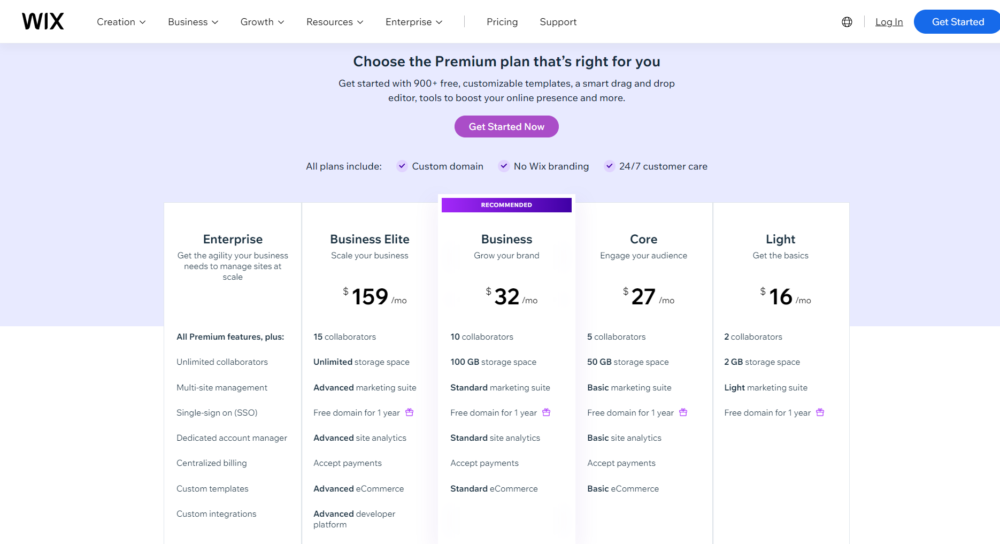
Wix gives you a one-year free domain name when you buy an annual premium plan (valued at $10 – $12) and $300 in advertisement vouchers (Google Adwords, Bing and Local Listings Ads).
There’s also a Wix App Market offering tons of free and paid plugins you can use to add additional functionality to your site (like chatbots, events booking, image animations, and more). We haven’t factored plugin costs into the cost of a Wix site, because the price of any Wix premium plan already includes tons of functionalities to get you started.
If you sign up to an annual Wix plan (rather than paying from month-to-month), you can save between 8% and 30% per year, depending on which package you select:
| Wix Pricing Plans | Monthly ($/month) | 1-Year ($/month) | Savings (%) |
|---|---|---|---|
| Light | $23 | $16 | 30% |
| Core | $34 | $27 | 21% |
| Business | $38 | $32 | 16% |
| Business Elite | $172 | $159 | 8% |
| Enterprise | Available on request | Available on request |
We know that signing up to an annual plan can seem intimidating, but chances are, you’ll want your site for at least a year. Choosing an annual subscription gives you extra features and saves you money in the long run!

WordPress Pricing: $0 – $200 Upfront
WordPress is an open-source CMS, meaning it’s free to download and use – which is great value. That said, a CMS isn’t the only equipment you’ll need in order to put a website live. Unlike Wix (and website builder in general), CMSs like WordPress require you to find and pay for your own:
- Hosting provider (we recommend Bluehost) – starting at $2.95/month
- Custom domain name – starting at $10/year
And in addition to those necessities, you’ll probably want to splash out for a few of these optional features, too:
- Pre-made WordPress theme – one-time payment of $25 – $299
- Plugins for additional functionality – $0 – $70 per plugin
All things considered, even though WordPress itself is free, the total annual cost to build a live WordPress site is a one-time fee of anywhere from $0 – $200, plus ongoing monthly costs of about $10 – $40. That said, you can do more with a WordPress website, truly customizing it to your business needs with help from a developer.
We recommend powering your WordPress website with Bluehost. It’s our top-rated WordPress hosting provider and it’s been endorsed by WordPress itself. What’s even better, prices for new customers start at just $2.95 per month. By hosting your WordPress website on Bluehost, you get access to lots of features which make the whole setup process much easier:
- One-click WordPress installation
- WordPress-centric user dashboard
- Free domain name and SSL security certificate
- Automatic WordPress updates
- 24/7 support from in-house WordPress experts
If you haven’t got the time to work on your WordPress site and monitor for updates, or if you want some theme customization that you’re unable to do yourself, then you’ll also need to consider the cost of a WordPress developer. Working with a developer will likely add at least a few hundred dollars to the final cost.

Ease of Use: Which Saves Time and Effort?
The Winner
Wix is easier to use than WordPress
Wix: A Beginner’s Dream
Wix is a What-You-See-Is-What-You-Get (WYSIWYG) website builder, so you can drag and drop paragraphs, pictures, slideshows, shopping cart buttons, and more anywhere on your web pages. You can also resize anything in a few simple clicks.
Although Wix’s ease of use score has remained at 4.4 out of 5 since last year, with Squarespace climbing up to the same score. Wix has been working to improve its website navigation, adding a search bar and author bios to blogs. It also has a pretty good logo maker, and plenty of apps to help you create an amazing and functional site.
To show you just how easy it is to build a website with Wix, we put this video together:
Although its drag-and-drop editor makes life that little bit easier, we can’t deny that Wix does have some limits. You can’t create a Wix template from scratch, for example. But it was designed for beginner and mid-level website creators to be able to be able to create a personalized site without any coding or technical experience. It’s safe to say the pros outweigh the cons here!
The main thing to know about drag and drop is that it’s very beginner friendly, because it removes the need for coding. If you can use PowerPoint, you can build a website using drag and drop!
It seems like the drag-and-drop editor was also favorite feature amongst users, with one saying:
“I love it, having worked on creating a website the other day with another builder, Wix is a breath of fresh air to use! So simple and easy that it makes a mockery of other builders.”
Another user found the platform “easy and satisfying” to use, but mentioned that:
“You have to be so careful of how you customize your template. As I added new elements my site quickly became messy and cluttered.”
Just because you don’t have to do any coding, doesn’t mean you can’t! The more adventurous among us can use Wix Velo to edit their site, which allows you to customize the raw HTML behind your template.
WordPress: For the More Experienced
Editing with Wix is like looking at your live website, and simply dragging different elements to where you’d live them. In other words, you’ll see in real time exactly how each edit will look on your live site.
When you edit with WordPress, on the other hand, you’ll have to save and preview each edit you make in order to see what it will actually look like. The editor displays content elements very differently from how they’ll look live.
Coding is a big part of the experience of editing a WordPress site, although recent updates make it much easier for the technically un-savvy. You definitely don’t need to be an expert – you can even install certain drag-and-drop website building tools to use with WordPress – but knowing a little bit of HTML will save you more than a few headaches with this CMS.

Design and Customization: How Creative Can You Get?
The Winner
Wix is better for design than WordPress
Wix: Plenty of Freedom for Beginners
Since our previous in-house testing, Wix has really improved its design and customization tools with a new and improved design rating of 4.6 out of 5. Increasing by 4.5% since last year’s design score of 4.4 out of 5 – a positive sign that shows Wix is moving in the right direction to catch up with design-conscious competitors like Squarespace.
Wix lets you pick from a massive range of over 800 templates, which come free with your Wix plan. All of these templates are categorized by industry and come pre-populated with example content, to give you an idea of what your final site may look like.
The reason Wix is on the rise in its design score is because of Wix ADI (an artificial intelligence builder), its 5/5 template designs, 5/5 brand and UX (user experience) design, and top of the range mobile editor.
Wix’s templates are beautiful, and very intuitive for your visitors to navigate. That said, mid- to advanced-level website creators will find Wix a little limiting, because its design flexibility is catered toward beginners.
Top Tip:
If you really aren’t bothered about design and customization, or simply don’t have the time, you can also use Wix ADI. This is a design assisted tool that will create your website for you, simply by asking you a few questions about your site’s purpose and your design preferences. To learn more about Wix ADI, read our review here.
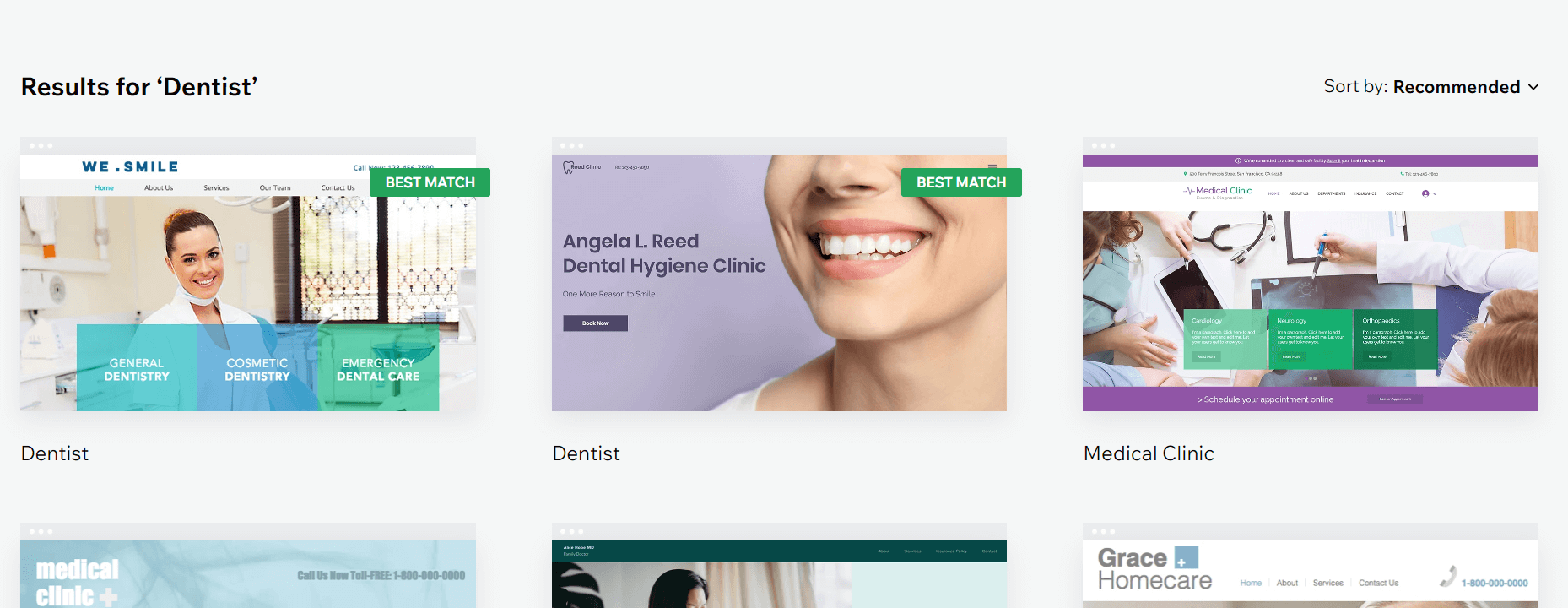
WordPress: Endless Customization
WordPress starts you off on a complete blank canvas. There’s practically no limit to how much you can customize a WordPress website. As we now know, the major drawback of this is that WordPress is more complicated than Wix. But ease of use aside, there are multiple design options when using WordPress. You can:
- Choose from over 200 WordPress-made themes
- Choose from over 5,000 WordPress-approved third party-made themes
- Work with a developer to create a completely custom theme
- Enhance your site with over 55,000 plugins
Top Tip:
While you can buy WordPress themes from a variety of sources, we’d recommend sticking to ones approved by the platform itself. This is to avoid paying for a sketchy theme thrown together by an amateur designer.

Some of WordPress’ in-house themes are free, which can be a great way to save money. However, if you’re serious about your site’s aesthetic, you’ll definitely want to invest in a premium theme. WordPress premium themes cost between $25 and $299. They’re by no means cheap, hence the lower value for money score in our research, but are the best option if you want a slick design that’s protected against bugs and updates.

Ecommerce: What's Better For Selling Online?
The Winner
Wix is better for selling online than WordPress
Wix: For Selling a Few Items
Of Wix’s five paid plans, four come with ecommerce completely built-in. For $27/month (when paid annually), you’ll have all the tools you need to sell online, such as:
- $100 ad voucher
- Minimum of 20 GB storage space
- Automated sales tax
- Ability to sell on marketplaces
- Ability to sell in multiple currencies
- Secure online payments
Wix is now our top-rated ecommerce builder (above Shopify & BigCommerce), and its plans are really for people who want a website that’s capable of selling a few products here and there. We wouldn’t recommend Wix for very large online stores – ambitious sellers should check out Shopify instead!
WordPress: For Launching an Online Store
WordPress’ ecommerce capabilities are far more advanced than Wix’s, but nothing comes built-in on WordPress. You’ll have to install an ecommerce-specific plugin before you can sell.
WooCommerce is the most popular ecommerce plugin for WordPress (and you can check out our WooCommerce review for more info). It can do just about everything you’ll need it to (and then some), from multi-currency selling to automatic tax calculation by region.
That said, because WooCommerce is open source (just like WordPress), you’ll still have to pay for associated WooCommerce costs, like your own hosting, domain name, and theme. There are plenty of free extensions available for adding shopping and shipping features, but the more scalable features will end up costing between $30 and $150/year as well. Even payment processors come at a range of different costs: WooCommerce Payments is free aside from transaction fees, while PayPal Pro charges $30/month in addition to transaction fees.
If you’d rather combine Wix’s all-in-one convenience with WooCommerce’s scalability, then a dedicated ecommerce website builder like Shopify will be the perfect happy medium.

Further Reading
See how WordPress does against an ecommerce superstar in our Shopify vs WordPress article.
What Does a Real User Think?
While we conduct our own research into every website builder we review, we like to ask real people about their experiences, too. We spoke to Rebecca, who’s spent the past 5 years teaching herself to build websites across a range of different platforms. Specifically, we asked her about her websites The New Black Studio (made using WordPress), and The Wedding People (built with Wix).
Having not looked for any investment when she started her business, Rebecca set up everything using her final pay check from her previous job. This meant she needed to keep costs down, and so decided to build her own website using WordPress. Since then, she’s built more than five other websites on different platforms, including Wix.
Apps and Plugins: Who Has the Best Extras?
The Winner
Wix Offers Higher Quality Apps
Wix: Quality
Wix’s App Market offers over 300 apps, some free and some paid, all of which you can add to your site in just a few clicks. You can browse different categories to find the kinds of tools you want, from ecommerce to media and marketing.
Managing your apps is easy to do through the site’s editor. There are quick access links in the dashboard which makes everything a lot more streamlined and user-friendly.
You won’t need to worry about installation because every app comes ready to integrate with Wix websites. And Wix reviews every third party app to ensure it meets in-house guidelines – so you won’t see any apps in the market that haven’t been approved by the Wix team.
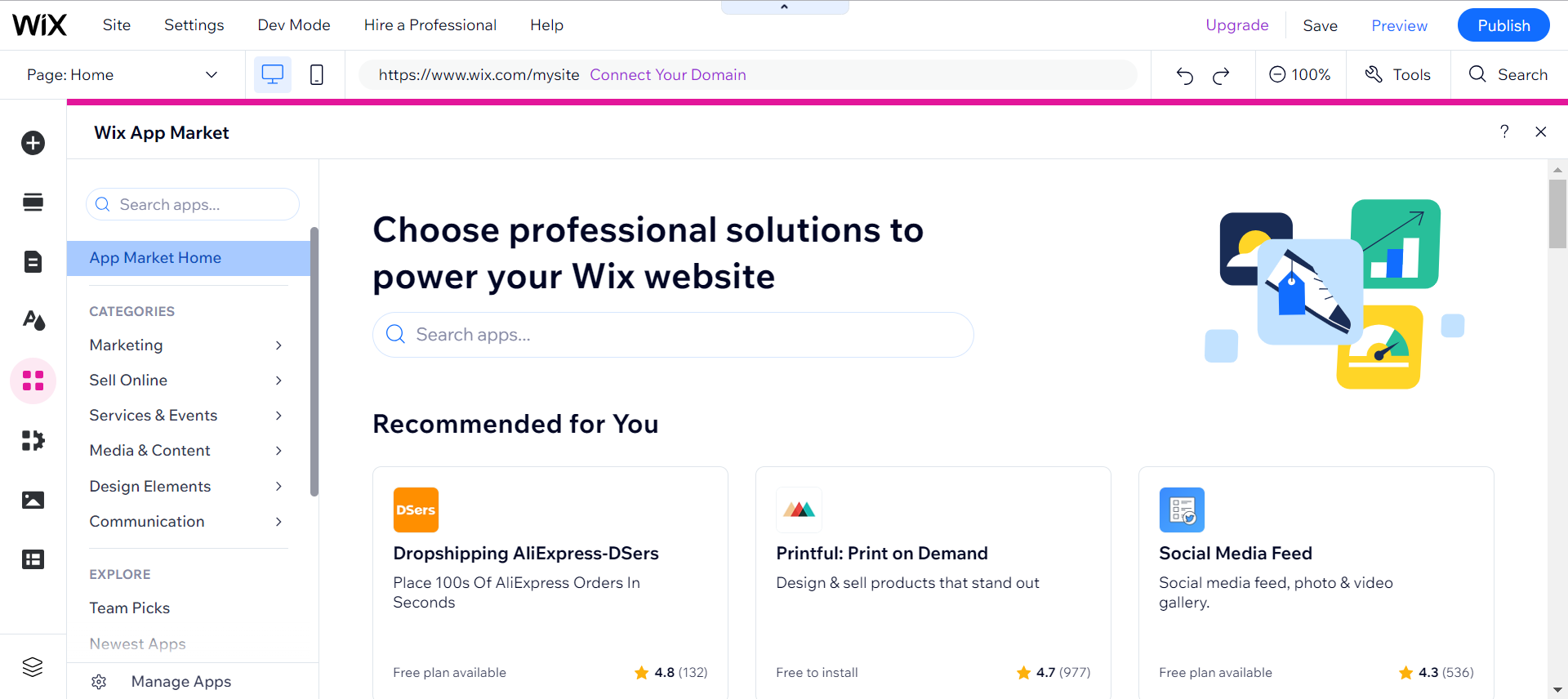
WordPress: Quantity
Since WordPress is an open source platform, any developer can use it to create plugins for other users to either purchase or download for free.
The upside of this is that there are over 55,000 WordPress plugins available – so odds are, you’ll be able to find exactly the website tools you want.
The downside is that there is no vetting process for creating a WordPress plugin, so you may have to sift through a few junky ones in order to find what you need – but you’re never more than a quick Google search away from user reviews that can steer you in the right direction.

Help and Support: Which Platform Will Have Your Back?
The Winner
Wix offers more support than WordPress
Wix: A Great Helping Hand
You can contact Wix’s in-house support team directly over phone or email from Monday to Thursday, 5am-5pm EST. You can also request a callback from the Wix team at any time. In addition to direct support, Wix also offers a ton of helpful articles and video tutorials created in-house. All of these support features contribute to Wix’s impressive help and support score of 4.8 out of 5.
Wix’s support score has seen a huge 10.5% increase, thanks to an easier to use knowledge center and a new video course in Wix Learn.
It’s comforting to know that Wix offers a comprehensive knowledge base, 24/7 live chat and phone service, and on higher plans gives you VIP support, where you can say goodbye to queues!

You can rest easy knowing that Wix has a high quality support system. And you can rest even easier knowing that, since the Wix editor is so easy to use, you probably won’t need to contact support very often anyway.
WordPress: You’re on Your Own
WordPress is a lot less personal when it comes to support, which is why it came out a lot lower in our testing with a 1.3 out of 5 rating. Because it’s open source, phone support is a lot less useful. Instead, you’ll have to rely heavily on articles written by other WordPress users.
The advantage of this is that there are so many WordPress sites out there – 43% of the web in 2023, to be exact – that chances are, someone will have the answer to whatever your issue is. The downside is that it can be frustrating to sift through thousands of lower-quality articles in order to find what you need.
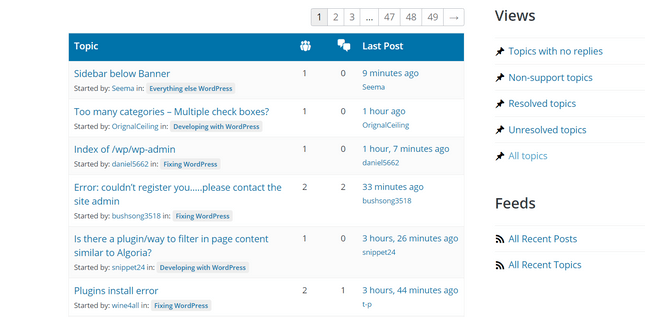
If WordPress support really throws you for a loop, then another option is to hire a skilled WordPress developer to help you set up, configure, or modify your website – but this can quickly get expensive. Before splashing out for a developer, it’s worth looking into the support options available through your hosting provider. For example, Bluehost provides customers with 24/7 access to in-house WordPress experts.

Blogging: Which Is Worth It for Wordsmiths?
The Winner
It's a Tie!
Wix: Better for a Small Blog Page
Wix began by offering the most basic blogging features, but Wix has made major effort to improve. Now it supports articles, includes categories and tagging, and has an archive of free media like images, videos, and GIFs.
In short, Wix has everything you need to add a blog to your site, it now includes a great commenting functionality, blog SEO, writer profiles, and sites are mobile responsive. Which does make it easier for viewers to read your blog on the go!
WordPress: Better for a Dedicated Blogging Site
WordPress actually has its roots in blogging, and since it’s such a powerful CMS to begin with, it allows you to publish and organize practically endless amounts of blog content to your site. It offers almost all of the same blogging features as Wix, plus a few more, such as:
- An optional private mode that makes certain posts invisible to your readers
- A native (not outsourced) commenting section, available only to readers with WordPress accounts
- The ability to backdate blog posts
- The ability to feature a single image across the top of a blog post
- Multi-language functionality
WordPress is pretty hard to beat in the blogging department, but it is missing one big perk that Wix offers: WordPress doesn’t have a free library of media ready to drop into a post. Instead, WordPress bloggers will need to locate their own free and copyright-free images online at sites like Pexels or Pixabay.
SEO: Which Is Better for Ranking on Google?
The Winner
It's a Tie!
WordPress and Wix actually have something in common when it comes to SEO – both rely on apps or plugins.
Wix: Easy and Cheap Integrations
Wix offers a bunch of in-house, dedicated SEO apps. Semrush is the most popular, which is a fantastic keyword research tool for discovering metrics like cost per click and search volume. You also get the Wix SEO Whiz which helps you optimize your website with helpful checklists, to improve your rankings the right way.
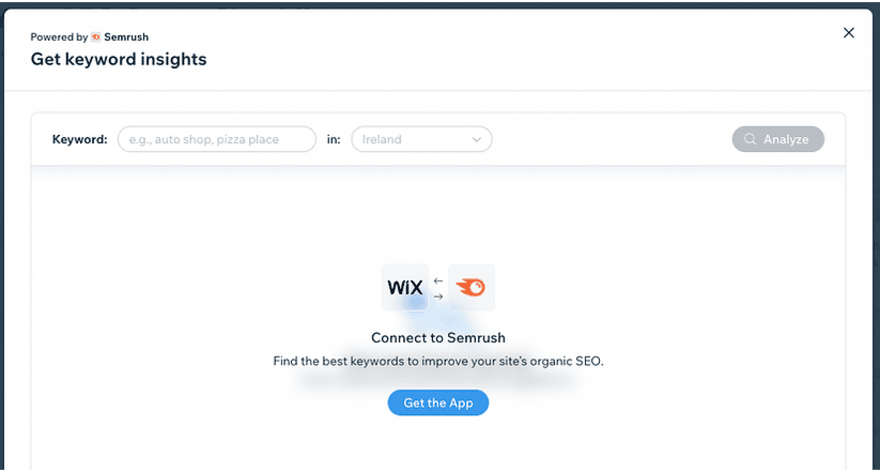
Wix stands out from other website builders for the amount of SEO-specific apps that it offers. You can read more about Wix’s full SEO capabilities in our dedicated Wix SEO review.
Since the last time we put Wix’s SEO under the microscope, further extended integrations have been added such as Google Analytics. This integration allows you to see how visitors are interacting with your site in real-time – pretty awesome!
WordPress: More Powerful Tools
Meanwhile, the number one SEO plugin for WordPress users is called Yoast, and is used by over 5 million websites. It offers both free and premium services (although the free option is very limited).
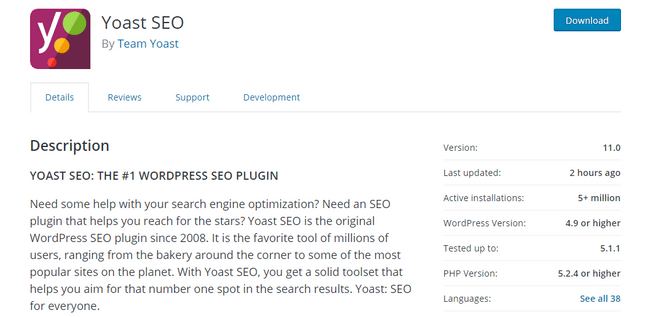
Yoast premium costs $99 per year (excluding VAT), and comes backed with great SEO features like:
- Editing metadata – Changing the text that appears on search result pages.
- Internal linking suggestions – Guidance on the best pages to link to on your website when creating a new web page.
- Redirects – Automatically sending someone to a new URL when you change the slug on an existing page.
Further Reading
Website Builder SEO vs WordPress SEO: discover which is better for getting your site found online.
Check out some of our own SEO tips on backlinking, anchor text, and website architecture.
Ongoing Maintenance: How Much Housekeeping Is Required?
The Winner
Ongoing Maintenance: Wix takes care of your site for you
Wix: Does the Dirty Work
Whenever the Wix platform updates, those updates are carried out by an in-house technical team, and automatically deployed to your site. In other words, you don’t have to lift a finger (and you probably won’t even know the updates took place). This is a real benefit, especially if you are not particularly tech-savvy.
Wix is also constantly creating new templates and apps for you to use. The apps can be added to an existing website at any time, but note that the templates can’t be switched once your site has gone live. So apps are always available to add new functionality to a Wix site, but templates are best left alone.
WordPress: Leaves It to You
The WordPress software is always updating itself to improve security and fix bugs. When this happens (a few times a year), you’ll actually need to update your WordPress website on your own. This is pretty easy to do: you’ll just get a message in your WordPress dashboard with a link to follow, kind of like installing an iOS update on a phone.
If elements like your theme and plugins are not updated, then you may risk these tools conflicting, and potentially hurting, the performance of your website.
That said, some web hosting providers will carry out any needed updates so that you don’t have to. For example, daily automatic updates of your WordPress website come as standard on Bluehost’s WordPress plans. In addition, most larger, more reputable theme and plugin developers will update their products for you – but that’s not always the case.

Wix vs WordPress: Summary and Recommendation
Wix is an easy to use, all-in-one website builder designed to help anyone create a stunning website. Meanwhile, WordPress is a powerful, flexible platform that gives you ultimate control over your site, from design to security. Wix is best for beginners, while WordPress is more technically challenging.
This really does all depend on what you’re looking for, though. For example, if it’s a large online store you have in mind, then Wix allows you to create a store quickly and effortlessly, WordPress is a great choice for scaling your business more.
As a recap, here’s a summary of our final thoughts below:
You Should Use Wix If…
…You don’t have a lot of technical experience in creating websites, and want an easy-to-use platform with no coding required. If you don’t use Wix’s free plan – which comes with tacky advertisements – it will cost you between $16/month and $45/month (paid annually). Overall Wix scores an impressive 4.8 out of 5 in our testing, mainly because of its easy-to-use, drag-and-drop editor and its extra site functionalities.
You Should Use WordPress If…
…You’re a little more tech savvy, and want power and flexibility. Be mindful – some coding knowledge is needed, and you’ll have to maintain your website when WordPress updates. Costs vary, but generally, you’ll be looking at a flexible $0 – $200 setup fee with ongoing monthly costs in place after that.
In conclusion, if you are a one person team or don’t have dedicated technical resources to help you build, maintain or troubleshoot a website, we recommend using Wix. If you’re still unsure, try signing up to a free trial and taking Wix for a test drive.
We hope that this discussion about the difference between Wix and WordPress has been helpful to you! If you have any other questions – that aren’t answered in our FAQs – drop us a comment and we’ll get back to you.





590 comments